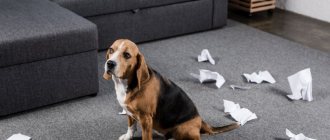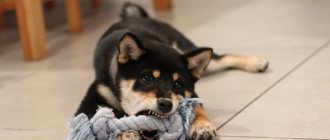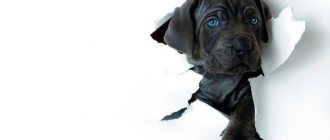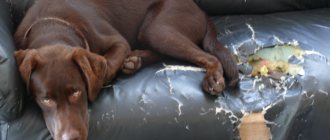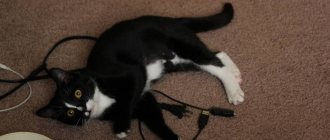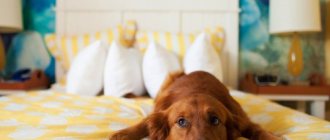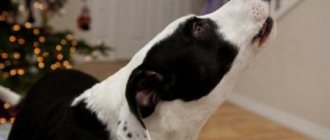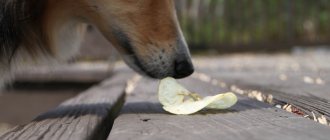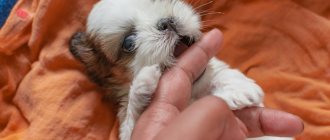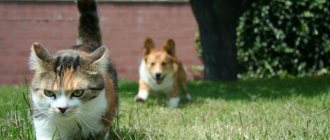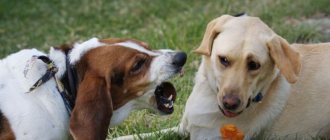Quadrupeds, without a doubt, have earned a number of clichés attached to them. The dog chews shoes, drools, makes puddles - all these are expected “side effects” of puppyhood. Moreover, the majority of animal lovers perceive these destructions as a given, justifying them with age. Let's take a closer look at why pranks are not always pranks and how to distinguish misdeeds from warning signs.
If you have raised a puppy or several dogs in your arms, you probably remember that nagging, rolling feeling that came when you opened the front door after returning from work. Every day you were ready to see a “testing ground” with broken flower pots, slobbered things... and a triumphant puppy with a stub of your slipper in its mouth. Surely you will remember scandals with family members whose belongings came into the sight of the little wrecker. probably be surprised, but almost all of this destruction could have been avoided if you knew what feelings your four-legged pet was guided by.
Important! When a puppy chews on shoes, it is annoying, offensive, but not fatal. However, do not forget that electrical wires, a box of washing powder or other unsafe objects can get into the baby’s teeth.
Why a dog chews shoes: main reasons
Statistics show that problems with chewing shoes and damaging the owner’s personal property are the most common reasons for owners’ disappointment in their pets. Thousands of owners around the world turn to dog trainers and experienced “colleagues” every day for advice. The problem is that the owner does not take into account the fact that the dog never spoils things for nothing.
The problem is that the owner does not take into account the fact that the dog never spoils things for nothing.
Even if the dog does not ruin your shoes, but often chews other things, the weaning methods are similar. Preserving shoes becomes more difficult because they retain the owner's scent for a long time. So, any destructive chewing at home is undesirable!
Dogs love to chew inedible objects and there are many reasons for this:
- Puppies chew shoes when they experience discomfort during the eruption of their molars.
- An adult dog may be attracted to the smell of shoes.
- No objects or toys that can be chewed.
- Older, well-behaved dogs may occasionally ruin your shoes to exercise their gums and remove plaque.
If you really want to stop your dog from chewing your shoes, punishing him for it, much less yelling at him, is useless. Behavior correction should take place in a calm environment, because the more excited the dog is, the more likely it is to ruin your things again.
Many inexperienced owners believe that the puppy must be severely punished so that he will not touch shoes again. Statistics suggest that this method works in 15% of cases. In 85% of cases, the dog continues to chew shoes, but in the absence of the owner.
To effectively combat unwanted behavior, it is necessary to determine its cause. Experience shows that shoe chewing is most often associated with:
Boredom – When a puppy or adult dog has nothing to do, it can (and most likely will) destroy everything around it.
The downside to physical activity is that chewing takes a lot of time and energy, especially in puppies. Finding shoes and getting them off the shelf requires some ingenuity. Simply put, if you don't exercise your dog, he will find something to do on his own, even if he knows you won't like it.
Stress and anxiety or disappointment and pangs of conscience - the smell of the owner helps to feel calmer, in addition, chewing is a fascinating process that allows you to distract yourself.
The disadvantage of communicating with the owner is that the dog can chew your shoes, things and even underwear, just because it craves communication. When you come home and punish your pet, the dog will receive it. This is a very subtle point in educational work, which is important to identify and correct in time. Otherwise, the dog will be in constant stress and spoil your things more often.
Useful video on the topic
In this video you will learn how to stop your pet from chewing everything. What tricks and methods exist, and how behavior adjustment differs in puppies and adult dogs.
If a pet chews on everything, then this is not only a blow to the owner’s nerves and the family budget. This behavior can harm the dog itself. A four-legged animal can get an electric shock, be poisoned by wallpaper glue or plant sap, or eat padding polyester, thread, and other “garbage.” And also damage the gums, esophagus and stomach with sharp fragments and splinters. Therefore, even if owners are not sorry for damaged things, they should think about the health of their pet.
Weaning a puppy from chewing shoes
When you discover your first damaged pair of shoes, don’t rush to start correcting your behavior. To be successful, you need to learn all aspects related to your pet's destructive chewing. Some dogs only chew shoes at night when the owner is sleeping. To attract attention, your dog may chew your shoes in your presence. To cope with boredom and anxiety, the puppy will destroy shoes when no one is home.
As soon as the puppy appears in the house, you should have at least 10 durable toys that the baby can chew. It is important to constantly maintain your pet’s interest in toys, so they are constantly replaced. Restock toys once or twice a month to make swapping more frequent and fun.
In some cases, dogs will ignore legal chew toys simply because they don't like the taste of the shoes. Most often, this addiction is associated with the presence of leather shoes in the house. To process raw materials, tannins are used, which lead to numbness of the gums.
Your puppy may have started chewing shoes for the first time due to discomfort associated with teething. Having stumbled upon leather shoes, he will remember for a long time that they have a special taste. Moreover, the dog will chew more and more new shoes in order to find a “treat” with an unusual taste. To eliminate your dog's craving for tannins, it is enough to provide him with chewable treats.
Active walks
Most often, dogs carry shoes when they are left at home alone. This happens because the animal is simply bored. That is why, before parting with your beloved pet for a long time, you should organize for him the longest and most active walk possible. Let the dog run around outside for at least an hour, play and frolic to its heart's content and expend as much energy as possible. When you return home, you should definitely feed the dog. As a rule, a tired animal will not engage in all sorts of nonsense in the form of damaging objects and things.
Practicing the “Fu” command
From the first days of living in a new home, the puppy must be taught the “fu” command. To practice this shoe command, place a shoe in the middle of the room and watch it. As soon as the puppy approaches the shoes, sternly say ugh.
If the puppy does not react and begins to chew on the shoe, silently take him by the collar and lead him to his place. When the puppy is on the bed, tease him with the toy for a few seconds and praise him when the baby begins to chew it. If the dog moves away from the shoes after the command, it must be generously praised.
It is important to practice the “fu” command when the puppy does not understand that he is being watched. You can watch your pet through a crack in the door or install a web camera and monitor your pet from the next room.
You will be surprised how difficult it will be for a puppy to overcome his desire. If the dog has learned the command, left alone with the shoe, it will approach it several times, try to take it in its mouth and move away again. Observe your pet until he begins to chew the shoe or becomes distracted. If destructive desires take over, quickly return to the room, give the command “fu” and take the puppy to its place by the collar.
If the dog coped with its desires and did not chew the shoes, do not give special significance to the event! The puppy did not do anything supernatural - he behaved correctly, and this is normal.
Presence effect
When leaving home, you can create the illusion of the owner’s presence for the animal so that it is not tempted to do prohibited things, in particular, carry shoes, chew them, scratch furniture and walls. As a rule, a low-volume TV or radio is sufficient for this. The main thing is to make sure that all wires and cords are out of the dog's reach.
It is necessary to stop bad behavior immediately at the moment of its commission, and not after everything has already happened. In other words, loudly said “no” will only work when the animal takes a shoe in its mouth, and not after the owner comes home and sees shoes scattered everywhere. That is why it is so important to provide the animal with comfortable conditions during forced loneliness, and not harshly punish for misdeeds.
Sources:
https://wikipet.ru/3765-sobaka-gryzet-obuv-chto-delat.html https://vashipitomcy.ru/publ/sobaki/soderzhanie_i_ukhod/kak_otuchit_sobaku_gryzt_obuv_vazhnye_momenty_perevospitanija/29-1-0-1931 https://kot- pes.com/kak-otuchit-sobaku-taskat-footwear/
Distraction method
When you return from a walk, do not let your dog off the leash until you take off your shoes and put them in an inaccessible place. Let the puppy see where you put the shoes! As soon as the shoes are hidden, immediately take the dog to wash his paws, and then play.
Take your puppy by the leash every time guests come to the house. Ask guests to put their shoes out of your pet's reach, but allow your pet to observe the process. If the dog behaves absolutely calmly and does not try to get into the closet, reward it with a treat. If the puppy intends to get to the shoes, distract him with toys.
If you don't remove your shoes and the puppy starts chewing them, restrain yourself and don't swear. Calmly approach the dog, offer it a toy or treat, and as soon as the puppy is distracted from the shoes, put them out of reach.
Note! Until a puppy is six months old, it is normal for a puppy to “attack” your shoes.
It usually takes several weeks for a puppy to completely wean himself from chewing shoes.
Funny toys
Regardless of age, the dog should have several of its own toys with which it can do whatever it wants: chew, drag, fumble, etc., as well as free space for movement. You can get used to having fun with toys by playing fetch or fighting for objects. The animal must understand that it has the right to do as it pleases with these things. At the same time, it is advisable to periodically acquire new interesting specimens.
How to stop an adult dog from chewing shoes
It takes less time to wean an adult dog, but more persistence and control.
If an adult dog chews shoes, the reason is most likely a matter of taste. To spoil your pet’s feelings, you can use folk tips and remedies.
- Dogs do not like the smell of mint, menthol and citrus. Generously spray your shoes (on the inside) with water and a few drops of essential oil.
- Many owners recommend rubbing the inside of their shoes with boric acid powder. This method is acceptable with an adult dog, but a puppy may unknowingly be poisoned.
Important! Do not use pepper or other hot substances, as you may damage the dog's sense of smell and it will make it impossible to wear shoes.
Actionable recommendations
- During the teething period, the puppy experiences a physiological need to rub its inflamed gums on a medium-hard surface. There is no point in scolding your baby for chewing things during this period. Be careful to remove valuables and leave chew toys out in plain sight.
- Don't let us play with worn out shoes. In the future, the dog will not be able to understand the difference between old slippers and expensive designer shoes. No shoe should replace a toy with your permission.
- In a critical situation, when no methods help, you should contact a professional dog handler.
It is difficult to find a dog breed that does not chew furniture and shoes. But if you follow the rules and recommendations, you can survive the playful puppy period and the change of teeth without significant losses. The main thing is not to provoke your pet with valuables left unattended.
A bored dog will knock over trash cans
When they are bored, dogs may rummage through trash cans and knock over bins. Roughly speaking, the psyche of these animals is similar to that of small children (up to about two years old). And if they don’t have enough attention, they will do their best to attract it by doing not the smartest things. Moreover, the dog may understand that it will be punished for knocking over the trash can. But she will still do it so that the owner will pay attention to her.
What are the dangers of chewing?
What threatens the dog if he chews shoes, sofa or bags? Any dog lover will immediately answer - a good spanking. But in reality everything is much more serious.
If for a person spoiled things are a reason to be upset and spend a couple of extra thousand, then for a pet playing with prohibited items will turn out sad. So:
- the dog tears things into pieces rather than just chewing them - there is a high risk that the bitten off pieces will injure the esophagus or stomach, block the airways, and lead to intestinal volvulus;
- if your pet chews on live wires, an electric shock and death are likely;
- a person's shoes carry pathogenic microbes, fungi, viruses - after treating themselves to shoes, the dog will get an infection.
